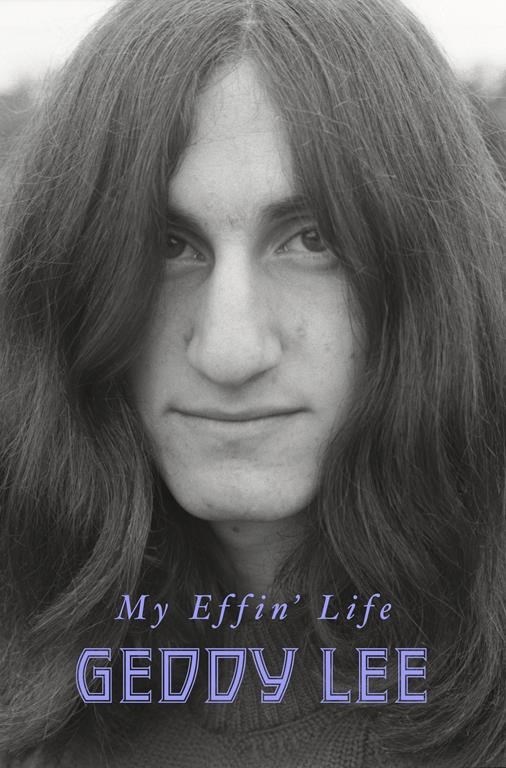Geddy Lee is a rock star, that's undeniable. But he's also a polite Canadian to the core. So it's fitting that the Rush icon picked a not-too-bawdy title for his memoir.
“My Effin’ Life” is an engrossing tale of a “classic underachiever” who became a Rock & Roll Hall of Fame vocalist, bassist, and keyboard player. It's a great read for anyone interested in the brilliant prog-rock trio or the music scene from the 1970s onward.
Lee's writing is a lot like his band's songs — deep, gloriously nerdy, sometimes wandering and wonderfully thoughtful. It's a 400-page narrative from a perfectionist who calls himself “Mr. Bossypants.”
“It’s a compulsion to exhaust every possibility to make the perfect record," he writes. "I don’t want to have to live with errors. Impossible, I know, but what’s the effin’ point of not shooting for the moon?”
The book is enlivened by photos of scrawled lyric sheets, studio doodles and private emails as Lee traces the rise of a band who faced a pre-MTV landscape, a lack of coast-to-coast progressive radio network or sympathetic critics. One reviewer said he sounded like “a guinea pig with an amphetamine habit.”
Readers will go chronologically as Rush — including guitarist Alex Lifeson and drummer and lyricist Neil Peart — go from sleeping on luggage in the back of a rented station wagon to five-star hotels. Along the way there are dubious sartorial choices like kimonos and lots of cocaine.
The band — considered the patron saints of brainy, technical, ambitious rock — leans on all kinds of sources, from the sci-fi of Robert. A Heinlein and J.R.R. Tolkien, to Ayn Rand, Rod Serling and Jean-Paul Sartre.
There are hard-won tips for musicians, like never believing any producer who says “Don’t worry, lads. It’ll all be fixed in the mix.” Lee also advises bands to demand final approval on everything, offer soundchecks and take your wallet onstage. One tip seems universal: “Do NOT drop psychedelics before an interview.”
It's a treat to see Lee geek out on audio equipment — like “the JP-8 with its trendy arpeggiator fed by an 808 drum box” — and later wine. Sipping a glass of 1978 Musigny he writes may be the most rewarding experience he’s had.
A private treasure is seeing the photo — snapped by a friend — that captured the moment Lee and his future wife Nancy first locked lips. “How many folks can boast a relationship of 50-plus years and still have a photo of their very first kiss?” he writes.
Lee throws shade at musician Billy Preston and producer Steve Lillywhite but also turns his critical eye on himself — his neuroses and poor husbanding — and his band, writing that with the album “Vapor Trails,” they “disappeared up our own asses.”
One thing to beware of is Lee’s modesty, like the time he casually mentions that he became “besotted” by baseball. In actuality, he has a massive collection of baseball memorabilia, including balls signed by the Beatles and Shoeless Joe Jackson.
Lee — born Gershon Eliezer Weinrib — was a “shy, long-haired, brooding character" who grew up in Toronto, born to parents who survived the Holocaust. This is not something he tosses off — it causes echoes throughout his life.
Chapter 3 — Lee says you can skip it, but you mustn't — is a meticulously examination of the horrific paths his parents took into hell, a 40-page indictment of Nazi evil that starts in Poland and ends with his mom rescued at Bergen-Belsen and dad from Dachau. Lee's laser-focus on details is put to astounding use here.
He suspects his earliest vocal style may have been rooted in his childhood “listening to the stories of what my parents had endured in the camps, suffering all the bullying and alienation, so that when I did begin to sing it did come rushing out as a screaming banshee.”
This is a memoir where tragedy seems always around the corner, especially later when bandmate Peart is tortured by loss. The memoir even ends with a scene in a Toronto cemetery where Lee introduces his grandson, Finnian, to the boy’s great-great grandfather — in the ground.
It may be hard in parts but always worth it. It's an effin' good read.
___
Mark Kennedy is at http://twitter.com/KennedyTwits
___
AP book reviews: https://apnews.com/hub/book-reviews
Mark Kennedy, The Associated Press



